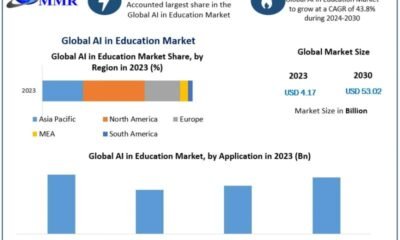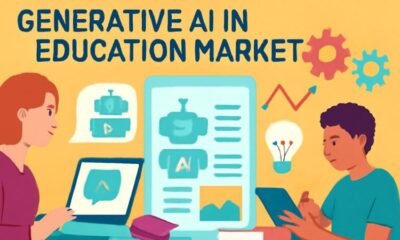AI Insights
Global Artificial Intelligence in Oncology Market Size to Hit

Artificial intelligence (AI) [https://www.coherentmarketinsights.com/industry-reports/global-artificial-intelligence-in-oncology-market] is playing an increasingly important role in oncology. There are various types of AI products that are helping in cancer screening, diagnosis, treatment, and drug development. One of the major products is an AI-assisted cancer screening tool. These tools use deep learning algorithms that have been trained on huge databases of medical images.
Request Sample Report: [https://www.coherentmarketinsights.com/insight/request-sample/6509]
Global Artificial Intelligence in Oncology Market Key Takeaways
According to Coherent Market Insights (CMI), the global artificial intelligence in oncology market size is expected to grow more than 7.6X, from USD 2,145.1 Mn in 2025 to USD 16,382 Mn by 2032, exhibiting a robust CAGR of 33.7%.
Based on component, software/platform segment is anticipated to account for a prominent market share of 64.2% in 2025.
North America is expected to retain its dominance, accounting for more than one-third of the global artificial intelligence in oncology market share in 2025.
Europe is projected to remain the second-leading market for AI-powered oncology companies.
As per Coherent Market Insights’ new global artificial intelligence in oncology market analysis, Asia Pacific is poised to witness fastest growth throughout the assessment period.
Increasing Cancer Prevalence Spurring Market Growth
Coherent Market Insights’ latest global artificial intelligence in oncology market research report highlights key factors driving market growth. One such prominent growth factor is the rising incidence of cancer.
The IARC’s Global Cancer Observatory projects that annual new cancer cases will surpass 35 million by 2050. This sharp rise in cancer incidence is anticipated to drive demand for artificial intelligence in oncology.
Artificial intelligence is revolutionizing oncology by enhancing cancer detection, treatment planning, and drug discovery. Therefore, growing cancer burden is poised to play a crucial role in driving adoption of AI-based oncology solutions over the forecast period.
High Implementation Costs and Data Privacy Concerns Restraining Market Growth
The global artificial intelligence in oncology market outlook indicates strong future growth. However, high implementation costs and data security concerns are limiting market growth to some extent.
Integrating AI technologies into oncology workflows requires significant investment in hardware and software. This deters small and mid-sized healthcare companies from opting for these technologies, thereby reducing global artificial intelligence in oncology market demand.
AI systems require access to large amounts of patient data, raising concerns about cybersecurity risks as well as potential misuse. This may also negatively impact the global artificial intelligence in oncology market growth during the projection period.
Get Instant Access! Purchase Research Report and Receive a 25% Discount: [https://www.coherentmarketinsights.com/insight/buy-now/6509]
Technological Advancements in AI Creating New Growth Prospects for the Market
Ongoing innovations in deep learning, computer vision, and natural language processing (NLP) are significantly enhancing AI applications in image analysis, drug discovery, and prognosis prediction. Such breakthroughs are expected to unlock new revenue-generation streams for industry players.
Advanced AI technologies are being increasingly integrated with imaging modalities like MRI and PET scans. This integration enables automated detection of anomalies, enhances diagnostic accuracy, and reduces human error.
Emerging Global Artificial Intelligence in Oncology Market Trends
Rising demand for precision medicine is a key growth-shaping trend in the market. Precision oncology requires analyzing large datasets, including genomics and biomarkers. This is where AI steps in, processing huge data and enabling creation of individualized therapies.
Expanding use of artificial intelligence in radiology and pathology is expected to boost the market. AI technologies are being increasingly used for tumor detection, segmentation, and classification through radiological and histopathological images. This is due to their ability to improve speed and consistency as well as reduce diagnostic errors.
Increasing adoption of AI in drug discovery and development is positively impacting the global artificial intelligence in oncology market value. This advanced technology is revolutionizing drug discovery by rapidly analyzing large datasets to identify potential drug candidates as well as predict their efficacy and toxicity.
Growing adoption of cloud-based AI solutions is significantly contributing to the expansion of the global artificial intelligence in oncology market. These solutions are increasingly favored for their cost-efficiency, scalability, and ability to provide seamless remote access to data and tools.
Request Customization: [https://www.coherentmarketinsights.com/insight/request-customization/6509]
Analyst’s View
” The global artificial intelligence in oncology market is set for rapid expansion, owing to growing prevalence of cancer, rising adoption of precision medicine, and technological advancements in AI technologies,” said senior analyst Komal Dighe.
Current Events and Their Impact on the Global Artificial Intelligence in Oncology Market
Event
Description and Impact
FDA Clears First GenAI-Powered Diagnostic Tool for Breast Cancer Detection (2025)
* Description: The U.S. FDA approved a GenAI-based diagnostic platform by PathIntel, capable of identifying breast cancer subtypes with high accuracy using real-world data.
* Impact: Such approvals signal growing regulatory acceptance of generative AI in oncology.
Tempus Collaborated with Boehringer to Accelerate AI Usage in Oncology
* Description: In May 2025, Tempus entered a multi-year strategic collaboration with Boehringer Ingelheim to apply its AI-driven oncology insights toward cancerfocused therapeutic discovery and biomarker development
* Impact: This will likely boost growth of the AI in oncology market.
Japan’s MHLW Updates Reimbursement Guidelines for AI Diagnostics
* Description: Japanese Ministry of Health, Labour and Welfare (MHLW) has approved reimbursement for certain AI-enhanced imaging diagnostics
* Impact: Such initiatives will increase commercial viability and adoption of AI oncology tools in Asia-Pacific, spurring more localized R&D and product launches.
Competitor Insights
Key companies listed in the global artificial intelligence in oncology market report:
– IBM Corporation
– Intel Corporation
– Azra AI
– NVIDIA Corporation
– Siemens Healthineers AG
– GE HealthCare
– Digital Diagnostics Inc.
– ConcertAI
– PathAI
– Median Technologies
– Microsoft
– Babylon
– Zebra Medical Vision
Key Developments
In June 2025, Viz.ai launched a new strategic alliance with Novartis to accelerate timely diagnosis and deliver AI-powered precision care for cancer patients. Through this collaboration, Viz.ai will focus on developing AI-powered workflows for breast and prostate cancer.
In November 2024, PathAI unveiled PathExplore Fibrosis. This new AI-powered tool is designed to revolutionize collagen, fibrosis, and fiber quantification directly from whole-slide images.
In January 2024, PathAI launched six additional oncology indications for PathExplore, expanding the AI-driven pathology panel to cover ovarian, bladder, liver, small cell lung, lymphoma, and head & neck cancers.
Global Artificial Intelligence in Oncology Market Segmentation:
By Component
Software/Platform
Hardware
Services
By Cancer Type
Breast Cancer
Lung Cancer
Prostate Cancer
Colorectal Cancer
Brain Tumor
Others
By Treatment Type
Chemotherapy
Radiotherapy
Immunotherapy
Others
By End User:
Hospitals & Clinics
Diagnostic Centers
Biopharmaceutical Companies
Others
By Region
North America
Latin America
Europe
Asia Pacific
Middle East
Africa About Us:
Coherent Market Insights leads into data and analytics, audience measurement, consumer behaviors, and market trend analysis. From shorter dispatch to in-depth insights, CMI has exceled in offering research, analytics, and consumer-focused shifts for nearly a decade. With cutting-edge syndicated tools and custom-made research services, we empower businesses to move in the direction of growth. We are multifunctional in our work scope and have 450+ seasoned consultants, analysts, and researchers across 26+ industries spread out in 32+ countries.
Media Contact
Company Name: Coherent Market Insights
Contact Person: Mr. Shah
Email:Send Email [https://www.abnewswire.com/email_contact_us.php?pr=global-artificial-intelligence-in-oncology-market-size-to-hit-usd-21451-million-by-2025-grow-at-a-cagr-of-337-coherent-market-insights]
Phone: + 12524771362
Address:533 Airport Boulevard, Suite 400, Burlingame, CA 94010, United States
Country: United States
Website: https://www.coherentmarketinsights.com/industry-reports/global-artificial-intelligence-in-oncology-market
Legal Disclaimer: Information contained on this page is provided by an independent third-party content provider. ABNewswire makes no warranties or responsibility or liability for the accuracy, content, images, videos, licenses, completeness, legality, or reliability of the information contained in this article. If you are affiliated with this article or have any complaints or copyright issues related to this article and would like it to be removed, please contact retract@swscontact.com
This release was published on openPR.
AI Insights
FDA plans advisory committee meeting on AI mental health devices

The Food and Drug Administration will convene experts to discuss challenges around regulating mental health products that use artificial intelligence, as a growing number of companies release chatbots powered by large language models whose output can be unpredictable.
The move suggests the agency may soon tighten its focus on such tools.
The Nov. 6 meeting of the FDA’s Digital Health Advisory Committee (DHAC) will focus on “Generative Artificial Intelligence-Enabled Digital Mental Health Medical Devices,” according to a notice published Thursday in the Federal Register. The notice says newly released mental health products using AI pose “novel risks and, as mental health devices continue to evolve in complexity, regulatory approaches ideally will also evolve to accommodate these novel challenges.”

This article is exclusive to STAT+ subscribers
Unlock this article — and get additional analysis of the technologies disrupting health care — by subscribing to STAT+.
Already have an account? Log in
AI Insights
Inside Apple’s Artificial Intelligence Strategy

Apple’s artificial intelligence strategy has become something of a paradox: A company famed for redefining consumer technology is now seen as trailing behind in the generative AI boom. Siri, hyped for years as a next-generation personal assistant, falls short of latecomers like Google Assistant and ChatGPT in intelligence and contextual awareness. And the recent debut of the iPhone 17 barely mentioned Apple Intelligence, its AI system that is still largely in the making.
To this day, the lion’s share of Apple’s AI capabilities are outsourced to third-party systems — an awkward position for a company long renowned for innovation. Now, many are wondering if the world’s most valuable brand will step back for good, let leaders like Google or OpenAI take the lead, and stay squarely in its hardware roots.
What Is Apple’s AI Strategy?
Apple’s approach to artificial intelligence appears to be slow, yet deliberate. Instead of building massive, general-purpose language models and public-facing chatbots, the company favors small acquisitions, selective partnerships and in-house developments that emphasize privacy and on-device processing.
But, despite the perception of being slow, Apple’s approach follows a familiar pattern. The company has always avoided making splashy acquisitions, instead folding in small teams and technologies strategically until it can scale in-house once the timing is right. This playbook has been repeated time after time, from Apple Maps and Music to its custom silicon chips.
So, what some see as Apple being late to the party is actually a calculated turtle-and-hare strategy playing out — or at least that’s what CEO Tim Cook says. Current partnerships with OpenAI and Anthropic keep Apple in the game while it quietly works on its own foundation models. Whether its next step involves buying, partnering or doubling down on its own research, the expectation is that Apple likely won’t stay behind forever.
Apple’s AI Strategy at a Glance
Apple’s approach to AI blends small but targeted acquisitions and carefully chosen partnerships with major players. While it hasn’t made any blockbuster moves just yet, the company seems to be quietly shaping its portfolio and shifting talent around to bring more AI development in-house.
The Acquisitions We Know About
During Apple’s third-quarter earnings call, CEO Tim Cook said the company is “very open to” mergers and acquisitions that “accelerate” its product roadmap, and “are not stuck on a certain size company, although the ones that [Apple has] acquired thus far this year are small in nature.”
Only four of these companies have been identified thus far:
- WhyLabs: An AI observability platform that monitors machine learning models for anomalies to ensure reliable performance. For Apple, this means more secure generative AI and optimized on-device intelligence.
- Common Ground: Formerly known as TrueMeeting, this AI startup focused on creating hyper-realistic digital avatars and virtual meeting experiences. Its tech is likely to fold into Apple’s Vision Pro ecosystem.
- RAC7: The two-person video game developer behind mobile arcade title Sneaky Sasquatch. This is Apple’s first-ever in-house studio, which will focus on creating exclusive content for Apple Arcade.
- Pointable AI: Three days into the year, Apple bought this AI knowledge-retrieval startup that links enterprise data feeds to large language model workflows. The platform lets Apple create reliable LLM-driven applications that can be integrated into on-device search, AI copilots and automation tools.
Internally, Apple is restructuring its ranks to prioritize AI development within the company, according to Cook.
Companies Apple Is Talking To
Apple has reportedly been exploring the purchase of Mistral AI, a French developer now valued at about $14 billion. Mistral has its own chatbot, Le Chat, which runs on its own AI models, as well as various open-source offerings, consumer apps, developer tools and a wide selection of APIs — all while sharing Apple’s hardline stance on privacy. For a while, Apple was also thinking about acquiring Perplexity, but walked away from the multi-billion-dollar deal in part due to mounting concerns over the AI search engine’s controversial web-scraping practices, which clash with Apple’s emphasis on privacy. Instead, Apple plans to become a direct competitor, beefing up its Siri product.
Meanwhile, Apple’s partnership with Anthropic has expanded significantly over the past few months. The collaboration now includes integrating Anthropic’s Claude model into Apple’s Xcode software, creating a “vibe coding” developer tool that helps write, edit and test code more efficiently. Apple is also considering Anthropic’s models in its long overdue Siri overhaul, with the new version expected to launch in early 2026.
But it’s not the only contender. Apple confirmed to 9to5Mac that it will be integrating OpenAI’s GPT-5 model with the iOS 26’s fall launch, and has reportedly reached a formal agreement with Google to test a custom Gemini model for the virtual assistant. Internally known as “World Knowledge Answers,” this feature would let users search information from across their entire device and the web, delivering its findings in AI-generated summaries alongside any relevant text, photos, videos and points of interest in a single, digestible view.
Together, these partnerships with Anthropic, OpenAI and Google give Apple the flexibility to test different AI systems and products and see which fits best into their existing systems, while also keeping their cards close to the chest.
How the Google Search Deal Fits In
Apple’s AI plans are also closely tied to its $20 billion-per-year search deal with Google, which makes Google’s search engine the default in Apple’s Safari browser and Siri. That contract accounts for a massive portion of Apple’s Services revenue — roughly 20 percent — giving the company the financial freedom to take a slower, more deliberate approach to AI.
Fortunately for Apple, this deal is still allowed under Google’s recent antitrust ruling. But if regulators ever choose to limit or terminate the deal, Apple would lose a critical cash stream and be forced to build its own solution. That looming risk could force Apple’s typical cautious approach into a sprint, making partnerships, acquisitions and internal development more urgent.
Why Is Apple Moving Slowly on AI?
Apple’s slow pace largely stems from a push-pull standoff between two top executives at the company. Eddy Cue, the senior vice president of Services, has long championed bold acquisitions to accelerate growth, while Craig Federighi, who oversees Apple’s operating system, wants to focus on building from within. Cue’s camp believes that buying startups is the key to gaining the upper hand in AI, whereas Federighi’s side sees acquisitions as a source of complexity and cultural friction.
At this point, Apple stands in stark contrast to competitors like Google, Meta and Microsoft, which are spending billions to acquire startups and poach top AI talent with hundred-million-dollar signing bonuses and even higher compensation packages. Instead, Apple has stuck to its cautious playbook, which has probably spared it from some costly missteps over the years. But it also leaves it vulnerable. If its rivals continue to outpace it in AI investment and adoption, Apple’s reputation of being “too big to fail” may face its toughest test yet.
Apple’s History of Selective Acquisitions
Apple has made more than 100 acquisitions in its history, but almost all were small, quiet and tech-driven. Now, with $133 billion in spending money, the company has enough to make a mega AI acquisition. But, given Apple’s patterned behavior of restraint, it may choose not to — which is why the current, multi-billion-dollar speculation around the company’s next move is such a big deal.
Here is a quick look at Apple’s past money moves:
1997 — NeXT ($400 million): This was the computer company Steve Jobs founded after leaving Apple. Once acquired, it brought Jobs back to the company as well as the foundation for the operating systems used for macOS and iOS.
2005 — FingerWorks (undisclosed amount): A startup that made gesture-recognition tech that enabled the iPhone’s multi-touch interface.
2008 – PA Semi ($278 million): Chip design firm that gave Apple the know-how to build its own silicon, leading to the A-series processors in iPhones and iPads and the M-series in Macs.
2010 – Siri ($200 million): A voice-assistant startup spun out of SRI International, Siri brought conversational AI to the iPhone and became a core iOS feature.
2012 – AuthenTec ($356 million): The fingerprint sensor company behind Touch ID.
2013 – PrimeSense (about $350 million): The 3D sensing tech that powered Face ID and AR depth cameras.
2014 – Beats Electronics ($3 billion): Apple’s largest-ever acquisition brought premium headphones, the Beats Music streaming service and key executives like Jimmy Lovine and Dr. Dre to the company, both of whom helped jumpstart Apple Music.
2018 – Shazam ($400 million): A music recognition app that was integrated into Siri and Apple Music.
2020 – Xnor.ai ($200 million): An edge AI startup that boosted Apple’s on-device, privacy-first AI by running machine learning models directly on devices, eliminating the need to send data to the cloud.
Does Apple use AI?
Yes, Apple has long incorporated artificial intelligence into its devices through features like Face ID, Siri and Apple Pay. The company’s proprietary AI system, Apple Intelligence, has been integrated across iOS, iPad OS and macOS.
Is Apple building its own AI?
Yes, Apple is actively developing its own artificial intelligence system, called Apple Intelligence. It is also working on a massive Siri upgrade, which is slated to roll out in 2026.
What AI companies has Apple bought?
Some of the AI companies Apple has acquired over the years include:
- WhyLabs: An AI observability platform that monitors machine learning models for anomalies to ensure reliable performance.
- Common Ground: An AI startup focused on creating hyper-realistic digital avatars and virtual meeting experiences. Its tech is likely to fold into Apple’s Vision Pro ecosystem.
- Pointable AI: An AI knowledge-retrieval startup that links enterprise data feeds to large language model workflows.
- Siri: A voice assistant spun out of SRI International that Apple has since integrated as a core iOS feature.
- AuthenTec: A fingerprint sensor company that Apple used to offer Touch ID.
- PrimeSense: 3D sensing technology that powers Apple’s FaceID and AR depth cameras.
- Shazam: A music recognition app that was integrated into Siri and Apple Music.
- Xnor.ai: Edge AI tech used to boost Apple’s on-device, privacy-first AI by running machine learning models directly on the device, without having to send any data to the cloud.
AI Insights
VWAGY’s Big AI Bet: Automakers Race to Harness Artificial Intelligence – September 11, 2025

Key Takeaways
- Volkswagen expects smarter AI-driven processes to save as much as 4 billion euros by 2035.
- General Motors partners with NVIDIA to use GPUs and digital twins for smarter manufacturing.
- Stellantis teams with Mistral AI, while BMW works with Alibaba to advance AI-driven assistants.
The automotive world is changing fast, with artificial intelligence (AI) becoming an integral part of it. German auto giant Volkswagen (VWAGY – Free Report) made headlines by pledging up to €1 billion ($1.18 billion) by 2030 to bring AI into vehicle development, factories, IT, and cybersecurity. The company hopes that smarter processes will not only speed up building new cars but also save up to €4 billion by 2035.
AI Across the Entire Value Chain
This push comes at a critical moment. Volkswagen is facing rising competition in China and pressure to cut costs in Europe, signaling that traditional manufacturing alone may no longer be enough to maintain its edge. By investing in AI, the company aims to accelerate innovation cycles and enhance efficiency. For Volkswagen, AI is expected to transform every layer of the business—from design and simulation to cybersecurity to how fast it can test and validate new vehicles.
VWAGY currently carries a Zacks Rank #3 (Hold). You can see the complete list of today’s Zacks #1 Rank (Strong Buy) stocks here.
AI is already reshaping the way people interact with vehicles, from in-car voice assistants to predictive maintenance and over-the-air updates. Automakers are quickly moving to make these technologies part of everyday driving. While every automaker may not be disclosing the AI investments they are making, their strategic alliances with top AI firms signal equally deep commitments.
GM, BMW and STLA’s AI Collaborations
U.S. legacy automaker General Motors (GM – Free Report) is deepening its AI capabilities through a partnership with NVIDIA (NVDA – Free Report) . GM has been using NVIDIA GPUs to simulate and validate advanced driving systems. The two companies are collaborating on a wide range of projects, from AI model training to in-vehicle hardware. General Motors is using the NVIDIA Omniverse platform to build digital twins of assembly lines.
These virtual environments allow General Motors to test and refine manufacturing processes before implementing them in the real world, reducing downtime and costs. In addition, General Motors will deploy NVIDIA DRIVE AGX in future vehicles for advanced driver-assistance systems and enhanced in-cabin safety features. NVIDIA is quickly establishing itself as the leading AI hardware and software partner for automakers.
Italian American automaker Stellantis (STLA – Free Report) is leaning on partnerships with AI specialists to improve both customer-facing and back-end operations. Its collaboration with Mistral AI covers vehicle engineering, manufacturing optimization and fleet data analysis. The partnership leverages Mistral’s expertise in large language models to accelerate development timelines and boost quality. Stellantis is also working with Mistral AI to build AI-driven assistants that act like conversational manuals for drivers.
Volkswagen’s close peer, BMW, has teamed up with Alibaba to make its Intelligent Personal Assistant (IPA) smarter. They are building a new AI engine together, based on Alibaba’s Yan AI from Banma’s smart cockpit system. This upgraded AI assistant will appear in BMW Neue Klasse cars made in China from 2026, aiming to make the driving experience more intuitive and interactive.
TSLA’s Unique Approach
Unlike these legacy automakers, Tesla (TSLA – Free Report) is positioning itself as more than just a car company. It is pivoting its core focus to AI, autonomous vehicles, and robotics. Tesla’s efforts include Full Self-Driving neural networks, autonomous driving systems, and the Optimus robot project. This approach gives Tesla a head start in innovation and sets it apart from traditional automakers.
The Road Ahead
AI is no longer a side project for automakers—it’s essential for staying competitive. Companies that integrate AI effectively—whether through in-house innovation like Tesla, big investments like Volkswagen, or smart partnerships like General Motors, BMW and Stellantis—will gain a lasting advantage in speed, efficiency, and customer experience. For automakers, keeping pace with AI isn’t optional anymore—it will decide who leads the future of mobility.
-

 Business2 weeks ago
Business2 weeks agoThe Guardian view on Trump and the Fed: independence is no substitute for accountability | Editorial
-
Tools & Platforms1 month ago
Building Trust in Military AI Starts with Opening the Black Box – War on the Rocks
-

 Ethics & Policy2 months ago
Ethics & Policy2 months agoSDAIA Supports Saudi Arabia’s Leadership in Shaping Global AI Ethics, Policy, and Research – وكالة الأنباء السعودية
-

 Events & Conferences4 months ago
Events & Conferences4 months agoJourney to 1000 models: Scaling Instagram’s recommendation system
-

 Jobs & Careers2 months ago
Jobs & Careers2 months agoMumbai-based Perplexity Alternative Has 60k+ Users Without Funding
-

 Podcasts & Talks2 months ago
Podcasts & Talks2 months agoHappy 4th of July! 🎆 Made with Veo 3 in Gemini
-

 Education2 months ago
Education2 months agoMacron says UK and France have duty to tackle illegal migration ‘with humanity, solidarity and firmness’ – UK politics live | Politics
-

 Education2 months ago
Education2 months agoVEX Robotics launches AI-powered classroom robotics system
-

 Funding & Business2 months ago
Funding & Business2 months agoKayak and Expedia race to build AI travel agents that turn social posts into itineraries
-

 Podcasts & Talks2 months ago
Podcasts & Talks2 months agoOpenAI 🤝 @teamganassi



















